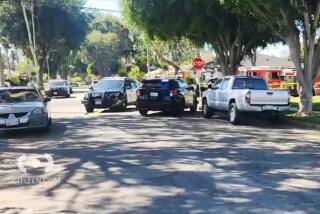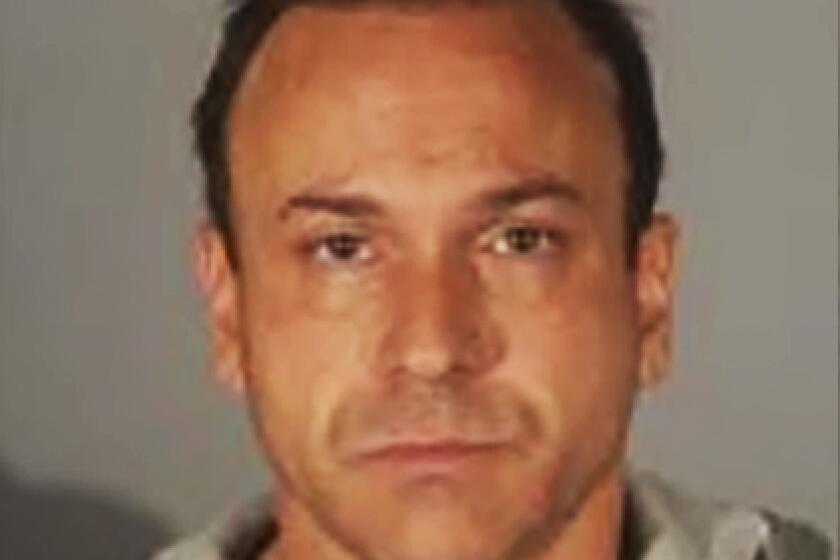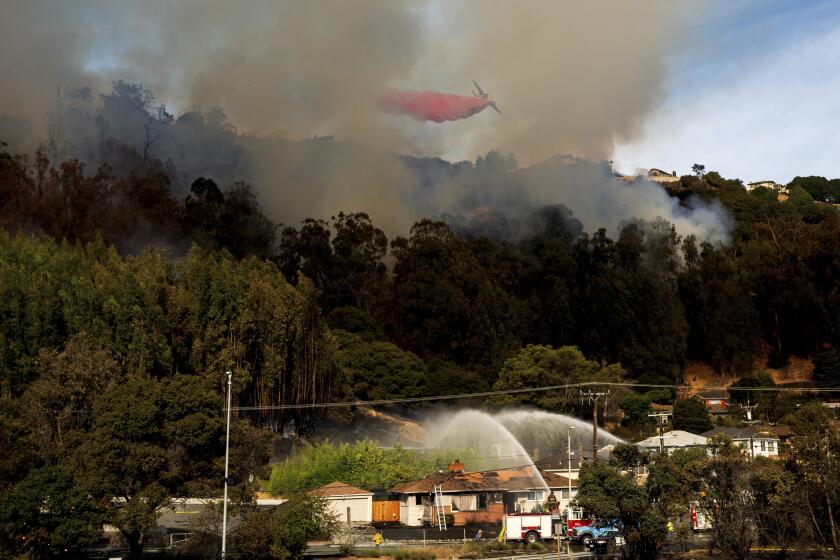Long Beach Debates Whether to Disband Its Police Force : Law enforcement: Sheriff’s deputies on temporary duty have impressed many. But some residents want to retain local control.
When county sheriff’s deputies’ patrols rolled into northern Long Beach 18 months ago to help the beleaguered local Police Department, deputies were greeted like conquering heroes.
They were feted with punch and cookies at neighborhood lawn parties and banners were strung up on the streets. “Welcome Sheriff--Good Riddance LBPD.” “Finally Real Cops.”
The deputies, brought in “temporarily” to patrol parts of the city while the police beefed up staffing, are still there. So popular have they proven that some leaders would like to abolish the eight-decade-old Long Beach police force and turn the entire city over to the Sheriff’s Department.
The move to make Long Beach the largest city in the nation without its own police force has startled and divided many in this town of 430,000, at the same time catching the attention of law enforcement groups around the country.
Issues of cost, civic pride and local control are the talk of cocktail parties and barbecues as residents mull the fate of their police force.
The debate is being conducted in an atmosphere of fear and unease over the crime that skyrocketed in Long Beach in the late 1980s, pushing out into every corner of the city. Local leaders who did not think they had a gang problem were confronted with one so dramatic that it made national headlines. A community once known for its small-town feeling and reunion picnics of Iowa transplants was violently reminded that it had changed.
Sheriff’s boosters speak of the deputies in almost mythic terms--they are the tough guys who are going to gallop into town and clean out the gangs and drug dealers. And they are going to save the city millions of dollars a year to boot.
But police supporters are appalled at the thought of becoming part of Sheriff Sherman Block’s “fiefdom.” They speak of the shame of turning the city’s most fundamental duty over to the county, of the sheriff’s controversial record in dealing with minority communities, of being at the mercy of a huge law enforcement agency that is already the biggest Sheriff’s Department in the country.
Then there are those who do not really care what color uniform local law enforcement is wearing or what it is called--as long as it is good.
“I think most people just want to get to the point of having kids safe when they play in the street,” said John Morris, a local restaurant owner who would prefer to keep the police.
The decision will be up to the City Council, which recently began holding a series of community meetings on the issue and may call for a public advisory vote on the matter. Now, the council is split, torn between desires to retain local control, save money and dump a local department that was for years a source of management headaches and complaints about service.
“This is called global, thermonuclear war. This is about survival,” said Councilman Les Robbins, a sheriff’s deputy who predicted that the hearings will turn into heated confrontations between the two sides. Not surprisingly, he is in the sheriff’s camp.
One of the key arguments in favor of the sheriff is money. Earlier this year, Block’s staff estimated that the Sheriff’s Department could cover all of Long Beach for $29 million a year less than it costs the city to run its 664-officer force. More recently, the Long Beach city auditor said the savings would be closer to $11.4 million to $14.5 million annually--because of ongoing pension and workers’ compensation costs that the city would continue to bear. That would still be more than enough to cover this year’s potential budget deficit of $8.3 million, a shortfall that has prompted a variety of proposed municipal cuts, including in the police and fire departments.
The other major argument used by Sheriff’s Department proponents is service. With different deployment practices and less administrative overhead, the Sheriff’s Department says it can put more officers on the streets than the Police Department. And people living in sections of the city patrolled by sheriff’s deputies swear by them, saying they are getting far more attention than they ever received from the police.
“I’ve been amazed how the sheriffs have been accepted in the areas they’re patrolling,” said Mayor Ernie Kell, who says he wants to hear more from the public before deciding whether to switch to the Sheriff’s Department. “They’ve never been happier with law enforcement. That surprised a lot of us.”
In the working-class neighborhoods of North Long Beach and along the tranquil streets of the East End, people grimace when they talk about the Long Beach Police Department. The anecdotes spill out of unanswered calls for help, of an understaffed force too busy with higher crime areas to tend to them.
“If you called them, maybe they’d come, maybe they wouldn’t. And if they did, it would take hours,” said Martha (Mike) Croft, a four-decade resident of North Long Beach who is full of praise for the deputies who cruise her streets and wants to see them patrol the entire city.
Croft recalled the time when some residents reported a gang fight in a park. Two hours later, Long Beach police phoned to ask if the gangs were still fighting.
On another occasion, Kymberly Beckman’s husband and young son were shot at while trying to track down the boy’s stolen bicycle. They raced home, called the police and the family waited outside with neighbors for three hours for a patrol car to show up. When Beckman called again, the police dispatcher replied: “Look, lady, you’re not priority. We’re busy.”
The next morning, when Beckman’s tearful son asked her: “When you get shot at, who do you call?” she could only reply, “That’s a good question.”
Beckman is so happy with the sheriff’s deputies that her family might move out of town if the deputies leave.
Police supporters do not deny that the department has had its troubles in recent years. Often at least 100 officers short of their budgeted strength, they were overwhelmed by the explosion of crime that rippled through the city in recent years. The long-powerful union was at war with city management and much of the rank-and-file detested former Chief Lawrence L. Binkley--who was fired in January in the face of mounting discontent with his crack-the-whip style.
“When you’re not happy at your job, you’re going to do as little as you can,” said Roberto Uranga, president of the local Hispanic Business Assn. “That happened.”
Yet by most accounts, the department’s performance has improved recently. Now nearly full strength, the force has a new, popular chief, a less contentious union president and the knowledge that if officers do not please the public they could soon all be knocking on the sheriff’s door for jobs.
“Long Beach police are doing the best job they’ve ever done,” Kell said. “There’s nothing like a little competition to make people work harder.”
Police seem to have further strengthened their hand during the disturbances that flared in Long Beach after the Los Angeles riots erupted. The department has won widespread praise for containing the looting and firebombing--which, while significant, never approached the extent of destruction in Los Angeles and Compton.
“It would be very shameful to not keep our Police Department,” said Uranga. He worries about the loss of local control, about becoming part of Block’s “fiefdom,” and about brutality allegations that have been lodged against sheriff’s deputies in other cities.
“The sheriffs still have a difficult time dealing with minorities,” he said.
Cmdr. John Hammargren, who until recently oversaw Sheriff’s Department contracts with cities, defended the deputies’ record. “I believe we have been stereotyped by a handful of incidents that happened to come in essentially a cluster.” He also noted that there have been few complaints against deputies patrolling North Long Beach, where a large number of minorities live.
“We work very hard with each community so we can reflect their needs,” Hammargren said. The 8,300-deputy agency has contracts to patrol 42 cities and the Metro Blue Line, as well as unincorporated areas of the county. The largest city covered by the department is Santa Clarita, with a population of 114,000.
Yet assurances of sensitivity are not persuasive to Long Beach’s extensive minority communities. “I haven’t heard from anybody who is really in favor of the Sheriff’s Department coming in,” said Long Beach resident Frank Berry, a regional official of the National Assn. for the Advancement of Colored People. “I don’t think their services are anything to be raving about.”
Minority members are particularly concerned that if the Police Department is disbanded, the public will lose its hard-won review of officers’ conduct. Brutality and misconduct complaints against the Long Beach force are reviewed by a civilian board formed two years ago. But the Sheriff’s Department has made it clear that it will not subject its deputies to such scrutiny.
Police proponents also argue that a local department is much more accountable than the sprawling Sheriff’s Department ever could be.
“You don’t appoint a sheriff. He’s elected. You can hire the police chief. You can fire him,” said George E. Rush, a criminal justice professor at Cal State Long Beach. “Who’s going to get rid of Block? That guy is a power. He’s a dynasty, for crying out loud.”
If the department were abolished, police supporters caution, it would be all but impossible to resurrect it. “The deed once done cannot be undone,” said Marc Coleman, president of a citywide political watchdog group. “We can then be held hostage to whatever the sheriff wants to do, both in terms of service and control.”
E. Gerrie Schipske, a member of the Long Beach Community College Board and the local chapter of the National Organization for Women, complained that getting rid of the department was an easy way of escaping problems that should have been attended to years ago. “It’s a real quick fix and absolves people of responsibility. . . . We need to fix and address the problems (in the department) that have brought us to where we are.”
Similar sentiments were expressed by Bud Stone, president of the Peace Officers Research Assn. of California, a statewide labor group that represents 38,000 police officers and sheriff’s deputies.
“I just cannot fathom why a city of that size would consider contracting out. . . . It’s totally irresponsible,” Stone said, adding that the move also defied the trend toward greater community control over law enforcement.
“There’s only one reason for a city to exist, to provide police and fire (service),” Stone said. “Everything else is luxuries.”
In the end, Uranga said, the city is fooling itself if it believes the Sheriff’s Department will turn back the clock to the good old days, when people left their doors unlocked and drive-by shootings were something they only did in 1930s gangster movies.
“With the sheriffs, we’re looking for a panacea. And it’s not going to happen, no matter who patrols.”
More to Read
Sign up for Essential California
The most important California stories and recommendations in your inbox every morning.
You may occasionally receive promotional content from the Los Angeles Times.











